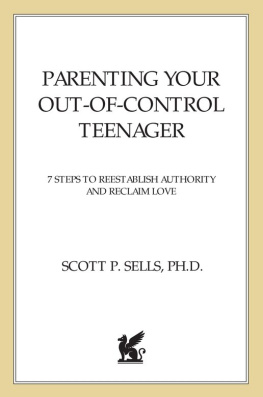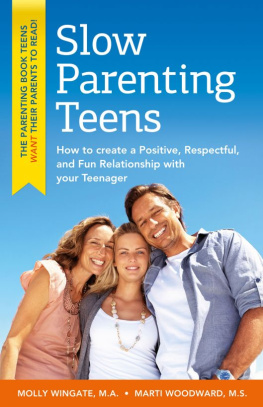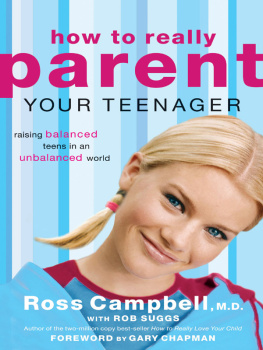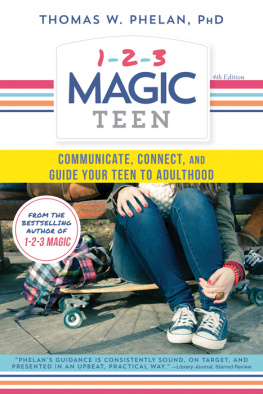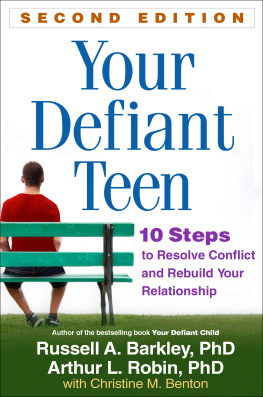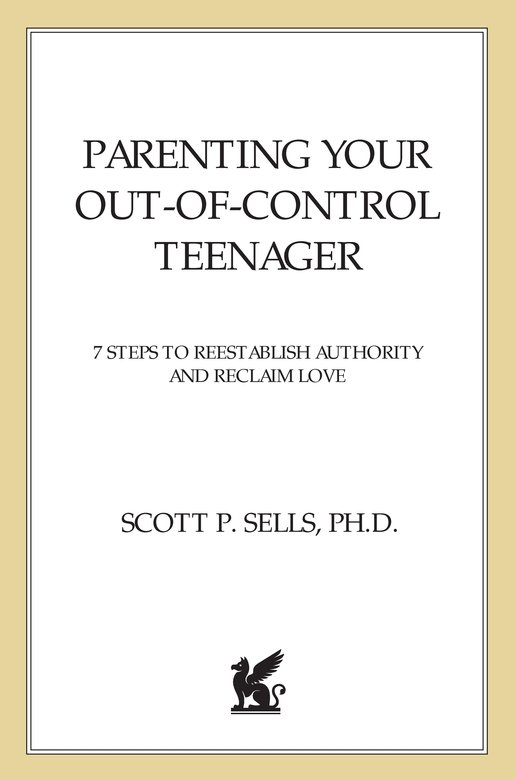I wish to thank the many people who supported me throughout the three years it took to write this book. Special thanks go out to my editor, Hope Dellon, her assistant Tanya Laplante, and my agent, Brian DeFiore. Hope and Brian, you believed in me when others did not. Your passion for this project and its importance to parents inspired me. Thank you all from the bottom of my heart.
Special thanks to my family and friends. Mom, you have stuck by me through thick and thin. You even gave up your retirement to work for me because you believed in what I am doing. Mom, you will never know how much that meant to me. Thank you. Dad, the values you instilled taught me never to give up. You are the best dad ever. Thanks to my sister Nancy, my brother-in-law Chris, and their three children for all their support. To my grandmother, Mary, and my grandfather, Treb, who taught me compassion and to believe in myself. To Stacey, your courage and friendship helped me become a better man. Thank you.
To the Rough River Gang (Tom Smith, John Walker, Mark Parrish, Tom Robbins, and John Robbins). Once a year we meet at a remote cabin in Rough River, Kentucky, to rejuvenate one another and find better ways to help difficult teens and their families. Your guidance and unselfish support was incredible. Thank you so much. To Dr. Neil Schiff and Jay Haley, without your support and knowledge this book would not have been possible. To Sally, who refused to give up on me and whose friendship I will always treasure. To Jane, thank you for your caring and most of all your unconditional friendship.
I am grateful to the social work faculty at Savannah State University, my director, Dr. Beverly Watkins, president Dr. Carlton Brown, and vice president Dr. Joseph Silver. All of you gave me the encouragement and support I needed to finish this project. I also wish to thank my editorial board (Patricia Bischoff, Shelia Affonso, Robert and Barbara Raju, Laverne Ricks-Brown, Ann Stout, Lorraine Farrall, Janet Tomasscheski, and Steve and Sonja Shrewsbury), who edited each chapter and provided suggestions. Because of your expertise, this book is much improved.
Finally, I wish to thank Ms. Yolanda Negron, who taught me that the name of our poor and emotionally hurt children is Today. Today they need our help and prayers and Today they need food, clothing, shelter, and unconditional love. Thank you to all of Todays children and families who touched my life over the years and whose stories, trials, and courage are contained within these pages. I wrote this book for you through Gods help.
CHOOSING THE RIGHT COUNSELOR FOR YOU
T he following are some suggested guidelines in choosing a counselor who understands out-of-control teenagers and knows how to treat them effectively. More information can be found at www.difficult.net under Help, I Need the Right Counselor Fast!
Some of the guidelines I cite are basic, core qualities that you should look for in any counselor. Without these qualities, your teen may not get better whether the counselor specializes in teen problems or not. (Some of these guidelines first appeared in Dr. Frank Pittmans excellent article, A Buyers Guide to Psychotherapy, in the January 1994 issue of Psychology Today. I highly recommend this article.) Other guidelines are based on my work with hundreds of teenagers and their families. Please note that these are just my opinions. You can choose to accept them or not.
Many people spend more time and effort shopping around for a new car than for a new counselor. Ask yourself which is more precious: a new car or the well-being of your teenager? I hope you answered your teenager. If not, things must be pretty bad at home, and you will definitely want to read this section.
Find Out as Much as You Can About the Counselor
Before committing to work with a counselor, you need to know what kind of person he or she is. If possible, hire a counselor who has worked effectively with people you know. You also can learn about a counselor by reading anything he or she has written.
Ask if he or she is a specialist in treating oppositional defiant or conduct disorders in teenagers. If the counselor says yes, ask how many teens he or she has treated and for an estimate of his or her success rate. If the counselor has seen fewer than fifty difficult children or teens or has had less than a 70 percent success rate, strongly consider moving on. Work with out-of-control teens requires experienced counselors.
You may want to make an initial appointment to meet the counselor without your teen and say something like this:
Before I consider treatment for my teen. I want to be the best informed consumer I can be. I would like to give you a brief description of my teens problem and then get a step-by-step overview of how you would best treat the problem. I realize it will be a general overview until you see my teen face to face, but please do the best you can.
If the counselor cannot give you a good overview of how he or she would treat your teen, find someone else. This counselor may have little theoretical grounding and be unable to see the bigger picture of how everything fits together.
If you wish, visit the website at www.difficult.net for a listing of counselors trained in the strategies in this book and a list of parenting classes near you.
Expect Active Responses from Your Counselor
You want a counselor who will talk to you, demonstrate an understanding of your situation, and give good advice. If a counselor passivelylistens to your story and has nothing enlightening or intelligent to say, dont go back. While you shouldnt demand instant, magical solutions, its unwise to assume that counselors know what they are doing if they say little after the first or second session. You need concrete, step-by-step tools to stop your teens misbehavior rather than someone who does little more than reflect your feelings back to you.
Should Your Counselor Agree with You?
On one hand, even if you may risk being labeled as difficult, you should challenge your counselor when his or her values or opinion on a particular issue seems to conflict with your own. Your counselor may be offering you wisdom that will save your son or daughter, but you still have to examine and understand it thoroughly.
On the other hand, you dont need a counselor who will always agree with you; you can go to your best friend if you need a yes person. Your counselor should have the courage to disagree with you and offer at least one concrete alternative suggestion to solve the problem.
If your counselor is too gentle and soothing and makes you feel that you have no part in the problem or solution, run for your life. Instead, choose the counselor who ticks you off occasionally by insisting that you take your share of the responsibility for your life and your relationships.
Be very afraid if your counselor says something like You really dont need to roll up your sleeves and take charge of your teens problem. All your teen needs is medication, a group home, detention, or a boot camp. As I emphasized throughout this book, your teen may improve in the short term with one of these approaches, but he or she needs your hands-on assistance to maintain the changes.
Dont Be in Too Much of a Hurry
While brief treatment can bring about great improvements in some situations, work with out-of-control teenagers usually takes time. Inmy experience, you should see some improvement in your teen after approximately four to eight sessions. (If not, you may wish to reevaluate whether this is the right counselor for your family.) To experience deep healing, however, you will likely need more counseling sessions depending on the severity of your teens problem, your burnout level as a parent, and the severity of other problems in your family (marital problems, alcohol use, depression, etc.). In my work, deep healing can begin to occur after ten to twelve one- to two-hour counseling sessions.

